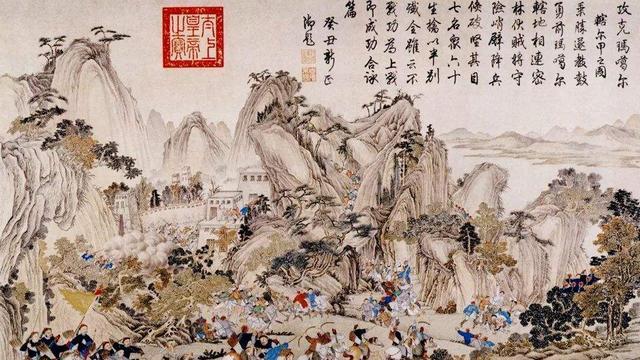What is history: it is the echo of the past to the future, the reflection of the future on the past. - Hugo
Located in the southern Himalayas, Nepal has historically inhabited more than a dozen different tribes within its territory, and in the early 18th century, three of these tribes paid tribute to the Qing Dynasty and began to become a vassal state of the Qing Dynasty.
By the late 18th century, the Gurkha tribes in the northwest region of Nepal gradually developed and grew, according to historical records, the Gurkha people lived in the southern foothills of the Himalayas for generations, is a typical mountain people, they are strong, the people are fierce, brave and fierce, and their combat effectiveness is super strong. Under the leadership of King Bona rachi, the Gurkhas soon unified the various ministries of Nepal and established the Kingdom of Nepal.

After that, the Gurkhas interrupted their contacts with the Qing Dynasty and continued to create friction in the border areas between the two sides. During the reign of the Qianlong Emperor, he sent troops to suppress the Gurkha invasion on many occasions, but did not fundamentally combat the aggression of the Gurkhas.
In the fifty-third year of Qianlong (1788), the Gurkhas took advantage of the turmoil in Tibet and sent troops to invade Tibet on the pretext of "salt and soil transported from Tibet". The Qianlong Emperor immediately ordered the minister stationed in Tibet and the governor of Sichuan to lead troops to quell the rebellion, and when they led more than 4,000 Manchu, Han, and Tibetan troops to the Gorkha border area, the enemy had already retreated. It turned out that in the face of the menacing Gurkha soldiers, the Tibetan rulers had privately signed a contract with them, promising to pay money to the Gurkhas every year.
Upon hearing this news, the Qianlong Emperor was furious and punished and dismissed a large number of Tibetan officials. However, since the Gurkhas had already retreated, Qianlong did not raise any more troops to fight.
Three years later, in 1791, the Gurkhas, who could taste the sweetness, once again sent troops to invade Tibet, and this time they were more unscrupulous than the first, burning and looting everywhere, and doing all kinds of evil. They captured the Buddhist holy site of Tashilhunpo Monastery, and the 10-year-old Seventh Panchen Erdene fled under the escort of his subordinates, and the enemy snatched the gold and silver Buddha statues in the temple, and even took away the golden book of the Qianlong Emperor's canonization of the Panchen Lama.
The Qianlong Emperor was furious and decided to send troops to completely address the threat of the Gurkhas in the southwest. This time, he did not let the Sichuan and Tibetan armies attack on their own, but cautiously sent the famous generals Fu Kang'an and Highland Cha. In terms of the mobilization of the army, in addition to the Sichuan soldiers and Tibetan soldiers standing in the southwest region, Qianlong also ordered the dispatch of a "special force" from Heilongjiang, thousands of miles away, to participate in the war against the Gurkhas.
Why did the Gurkhas, who were located in the southwest, have to send troops from Heilongjiang, which is thousands of miles away? Just because they were "Solenda soldiers", they were the NO1 in the military circles of the Qing Dynasty.
According to the "Heilongjiang Waiji", after the Manchu Eight Banners originating in the northeast entered the customs, all the ethnic minorities in the Heilongjiang area were called "Solun", including the Evenk, Orunchun, and Dahan people.
These tribes are all nomadic people living in the large and small Xing'anling areas, the survival ability is extremely strong, everyone is a natural riding and shooting master, from the Kangxi period, the Qing Dynasty from the Heilongjiang Solun departments to draw fine, formed a "Solun Eight Banners", after which every year will be held exercises, over time, solun Eight Banners became the "special forces" in the Qing army. For example, the great general Highlander, who was leading the army at that time, was from the Solenda soldiers.
The Qianlong Emperor was very clear about the combat effectiveness of the Solenda soldiers, and he commented that the Solenda soldiers were "very strong, strong and agile, and the soldiers of Shengjing were not inferior to the Solon soldiers." "And to deal with the Gurkhas who are good at mountain warfare and close combat, the Solenda soldiers are undoubtedly the best candidates." Therefore, Qianlong was not far away, and dispatched Solenda soldiers into Tibet to march out.
Due to the long distance, this Solenda army walked for several months before reaching the front, during which time many ministers wrote to Qianlong asking him to order a full-line counterattack, but Qianlong insisted on not allowing it, and he said that he must wait until the Solenda soldiers arrived before launching a counterattack.
In April 1792, when the Solenda army, which had straddled north and south, finally arrived at the front, the Qianlong Emperor immediately ordered Fukang'an and Highlander to attack. As a result, in the first battle, the Solenda soldiers gave the Gurkha soldiers a dismount, after a short exchange of soldiers, the Solenda soldiers killed and captured more than 800 elite Gurkha soldiers, since then, the Gurkhas have been devastated, defeated and retreated, and soon the Qing army invaded the territory of the Gurkhas, and forced the Gurkha king to surrender, personally to Beijing to meet the Qianlong Emperor. In the end, the war ended in a total victory for the Qing Dynasty.
Throughout the Qing Dynasty, the Solenda soldiers have been active in the northwest frontier, from Tibet to Xinjiang, and there are Solenda soldiers fighting bloody battles everywhere. They made outstanding contributions to maintaining the stability of the Qing Dynasty's frontiers and the integrity of the Chinese nation.